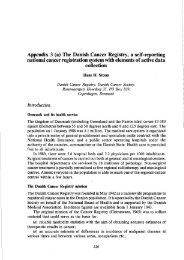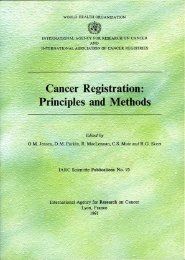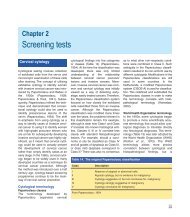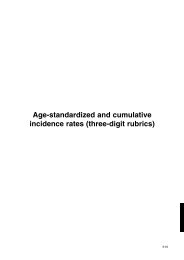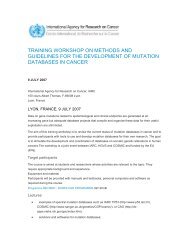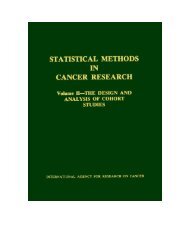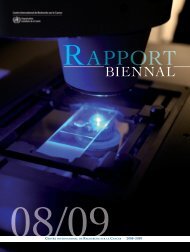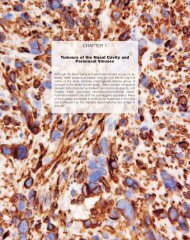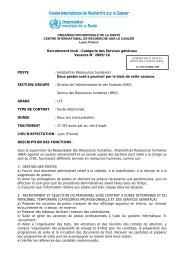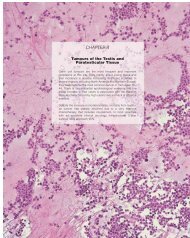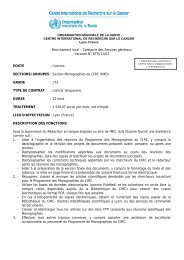3. general considerations for the analysis of case-control ... - IARC
3. general considerations for the analysis of case-control ... - IARC
3. general considerations for the analysis of case-control ... - IARC
You also want an ePaper? Increase the reach of your titles
YUMPU automatically turns print PDFs into web optimized ePapers that Google loves.
INTRODUCTION 33<br />
in which at least 15 000 subjects identified from hospital records were requested to<br />
provide in<strong>for</strong>mation, <strong>the</strong>re was no such litigation nor serious threat <strong>of</strong> it. Despite this<br />
experience, which seems typical <strong>of</strong> epidemiological research, it is <strong>of</strong>ten not possible to<br />
persuade hospital administrators to cooperate. When non-cooperation is anticipated it<br />
is useful to make initial contact with a hospital through a staff physician who supports<br />
<strong>the</strong> research.<br />
The next stage is to abstract <strong>the</strong> medical records <strong>of</strong> <strong>the</strong> <strong>case</strong>s, and <strong>of</strong> potential <strong>control</strong>s,<br />
at locations where cooperation was received. If possible <strong>the</strong> items on <strong>the</strong> record abstract<br />
<strong>for</strong>m should follow <strong>the</strong> sequence <strong>of</strong> <strong>the</strong> medical record, but this may not be possible<br />
if several different hospitals are involved. If <strong>the</strong> medical record abstract involves in<strong>for</strong>mation<br />
pertinent to <strong>the</strong> exposures under evaluation, as occurs when <strong>the</strong> role <strong>of</strong> drugs<br />
is in question, it is important to blind <strong>the</strong> abstractor to <strong>the</strong> <strong>case</strong>-<strong>control</strong> status <strong>of</strong> <strong>the</strong><br />
record. It is also important to delete from <strong>the</strong> record or to mask any in<strong>for</strong>mation relating<br />
to exposures sustained after <strong>the</strong> <strong>case</strong>'s cancer was diagnosed, and during <strong>the</strong> equivalent<br />
time <strong>for</strong> <strong>the</strong> <strong>control</strong>s. These things will usually prove difficult and will involve at<br />
least two people in <strong>the</strong> record abstracting process. None<strong>the</strong>less, both are usually justifiable.<br />
It is best to conduct interviews concurrently <strong>for</strong> <strong>case</strong>s and <strong>control</strong>s. This should minimize<br />
<strong>the</strong> likelihood that learning by those ga<strong>the</strong>ring <strong>the</strong> data will influence <strong>the</strong> results.<br />
It would also minimize any effects <strong>of</strong> short-term changes, such as those <strong>of</strong> <strong>the</strong> seasons,<br />
or <strong>of</strong> some unexpected publicity about <strong>the</strong> cancer or <strong>the</strong> factors under study.<br />
It is <strong>of</strong>ten recommended that, when <strong>the</strong>y are involved, <strong>the</strong>re should be as few interviewers<br />
as possible, preferably one. The rationale <strong>of</strong> this is that it will introduce uni<strong>for</strong>mity<br />
into data collection. But, if <strong>the</strong> quality <strong>of</strong> <strong>the</strong> work is poor or if <strong>the</strong> interviewer<br />
is biased, a study would be ruined by having only one interviewer. It seems wiser, when<br />
practical, to have several well-trained interviewers. When more than one interviewer is<br />
used, it may be in<strong>for</strong>mative to analyse <strong>the</strong> principal study factors on an interviewerspecific<br />
basis. A positive result based on in<strong>for</strong>mation from only a small proportion <strong>of</strong><br />
<strong>the</strong> interviewers would be a cause <strong>for</strong> concern.<br />
There are several suggestions concerning interviewers which are sound but difficult<br />
to meet. One <strong>of</strong> <strong>the</strong>se is to keep <strong>the</strong> interviewers, and all study staff, unaware <strong>of</strong> <strong>the</strong><br />
principal hypo<strong>the</strong>sis(es) under evaluation. But even if <strong>the</strong> investigator attempts this,<br />
<strong>the</strong> interviewers usually become aware <strong>of</strong> what is important from <strong>the</strong> interview <strong>for</strong>m<br />
itself or from sources external to <strong>the</strong> study. Ano<strong>the</strong>r suggestion is that <strong>the</strong> interviewers<br />
be unaware <strong>of</strong> <strong>the</strong> status (<strong>case</strong> or <strong>control</strong>) <strong>of</strong> each subject <strong>the</strong>y interview. One way<br />
<strong>of</strong> doing this is to have one person arrange <strong>the</strong> interview and ano<strong>the</strong>r conduct it.<br />
This may prove effective <strong>for</strong> interviews conducted in hospital but is rarely even possible<br />
<strong>for</strong> those done at home. The reason is that <strong>the</strong> subjects, both <strong>case</strong>s and <strong>control</strong>s,<br />
usually want more in<strong>for</strong>mation than was given <strong>the</strong>m about <strong>the</strong> objectives <strong>of</strong> <strong>the</strong> study<br />
and <strong>the</strong> reason <strong>for</strong> <strong>the</strong>ir inclusion. In order to answer such questions in an honest, even<br />
if ambiguous, way <strong>the</strong> interviewer usually has to know <strong>the</strong> subject's status. The need<br />
<strong>for</strong> ambiguity <strong>of</strong>ten arises because many physicians still do not want <strong>the</strong>ir patient told<br />
<strong>of</strong> <strong>the</strong> diagnosis <strong>of</strong> cancer. Ano<strong>the</strong>r reason is that <strong>the</strong> interviewer does not know, or<br />
should not in<strong>for</strong>m <strong>the</strong> subjects, about <strong>the</strong> specific purpose <strong>of</strong> <strong>the</strong> study. A third suggestion<br />
concerning interviewers can and should be met: each <strong>of</strong> <strong>the</strong>m should deal with<br />
<strong>the</strong> same ratio <strong>of</strong> <strong>control</strong>s to <strong>case</strong>s as exists in <strong>the</strong> study as a whole.



